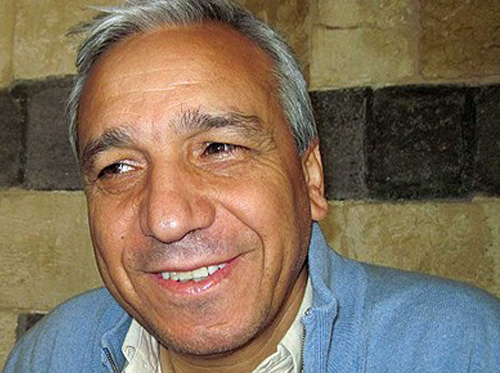Exclusive interview of one of the leaders of the Syrian opposition to Mediamax
Yasin Al-Haj Saleh- is a Syrian writer and political dissident. He writes on political, social and cultural subjects relating to Syria and the Arab world. In 1980 he spent time in prison in Syria for his membership in a communist party. He was arrested while he was studying medicine in Aleppo and spent sixteen years in Tadmur prison.
Today he lives in Damascus and supports the Syrian opposition. His articles about the developments in this country are published in The New York Times, Lebanese The Daily Star and Middle East Jadaliyya.
- What has brought the Arab Spring to Syria?
- You must have already noticed that revolutions happen in countries whose leaders are tyrants, who have been ruling the country for decades and want to pass the power on to their children after their death. For many years people thought this is how things should be. It found its reflection in the style of leadership of these countries’ leaders: pressure on the opposition, royal lifestyle and lack of freedom for media.
Syria has been a country where the family power was very strong. After coming to power, Bashar al Assad continued the tough security system created by his father, eliminated the opposition and began the so-called policy of “liberalization of the economy”. As a result, during 11 years the public resources, media and communication means became a monopoly in the hands of private individuals.
As a result of this policy the small towns, unlike the big ones, were deprived of attention. The alienation between the elite and the ordinary population keeps growing… This is why the revolutionary movement began about a year ago.
We can say that the Syrians were inspired by the positive outcome of revolutions in Tunisia and Egypt. The countries of the Arab world are strongly interconnected from the emotional and cultural points of view, and this was the reason that the Arab spring easily moved from Tunisia to Egypt, Libya, Yemen, Bahrain and Syria.
- Do you really think that after the change of the regime Syria will become a more democratic country? Aren’t you afraid of Egypt’s example? The revolution was over a year ago there but the instability still continues and again forces people to come to Tahrir Square.
- It’s naïve to think that after 50 years of ruling of “Baas” Party and 42 years of dictatorship of the Assad family, Syria can quickly become a country which is guided by democratic principles. There is a huge watershed between social classes; there are religious and separatist forces, a weak production. The public masses, which fight against dictatorship and want the country’s society to be freer, participate in democracy building. I think the revolution in Syria will lead to more freedom, pluralism will prevail and good opportunities for discussing social, political, legal issues will be created, but nevertheless stable democracy is a harder process.
For reaching democracy it’s not enough to change the regime only. It is necessary to spiritually escape from the reign of the Assad in Syria, which has brought the political environment to a physical and spiritual crisis. If the revolution does occur, the public will face serious challenges: it is necessary to make a reconstruction for the first time in country’s history, expand the contacts between various layers of the society trying to reconcile them. This is the essence of the nearest future and the actions of the Syrian people who want to take the path of democratization.
I also think that the current situation in Egypt is anyhow better and more stable than during Mubarak’s reign. The Islamists, who make a majority of the Egyptian political system today, have lost their status of a “victim” and seem to succeed trying to identify social and economic tasks of Egypt and searching for relevant solutions. Today, Egypt already has a good chance for political debates and big political freedoms. This story is full of problems which are not “eternal” and will not turn into a swamp.
- In one of your interviews in 2005, you made the following forecast: “…the scenario I prefer is the full change of the regime. More pressure on the current regime from outside is necessary so that more and more Syrians become engaged in social activities. And the bigger the number of such Syrians is, the better future Syria will have…” Is this scenario possible today or Assad must leave in any case?
- Things were different in 2005. What disturbed the public order in the country at that time was an external pressure, and there was a need to cause big public interest of Syrians towards political processes. It was done because there were fears the regime will collapse and the Syrian public will be politically inactive. Today the situation is quite different. We are watching a revolution, rallies attended by active Syrians in various regions, which will certainly lead to the collapse of the regime. Assad, who as of 17 February 2012 killed 8.280 people, must leave.
- On 7 December 2011, in an interview to one of U.S. TV channels, Assad said: “…we have never said that we are a democratic country, but at the same time we are not what we were before, we are moving forward… thanks to reforms. We have registered big progress during last 9 months. It will take a long time to become a democratic country, but we are on that way. Everything I do is based on the will of my nation…” It seems that the President of Syria needs more time to conduct reforms and he asks for it. Why doesn’t the opposition agree to give a chance to Assad?
- You are talking about a man who came to power 11 years ago. At first he said economic reforms are a priority, then he passed to administrative reforms, allegedly in the name of provision of security in the country. I don’t know examples from history when such tyrants as Bashar al Assad – the lovers of power and money - ever changed and became the adherents of democratic values. The new text of the Constitution will be put on vote in the days to come. This is another proof that the regime doesn’t indent to pass to democracy. This Constitution gives unlimited power to Assad and a chance to nominate his candidacy at presidential elections in 2014. It gives nothing to an ordinary Syrian… Hundreds of Syrians have died during the period of adoption of this Constitution. According to new Constitution, Assad doesn’t bear responsibility for everything he is doing within his authorities, and the only exception is “treason”. Thus, according to a new Constitution, Assad is not responsible for the death of thousands of people murdered by his order. The new Constitution suggests minimal damage to the family and the possibilities of the President.
- The supporters of Assad accuse the opposition of becoming a toy in the hands of the West. What can you say about this?
- Well, the system is always right in criticizing its rivals… The revolution in Syria began without the assistance of any Western country and a year before that the relations between these Western countries and the Assad regime have improved more and more, and nobody spoke about the Syrian people or the opposition at that time. Yes, many people link this revolution with the West. In any case, I believe these forces will try to influence the opposition in the nearest future and do everything possible so that this revolution served their interests. We will see it very soon.
- What do you think, how likely is it that the Libyan scenario will repeat itself in Syria?
- Nobody seems to wish such a repetition. Neither Syria nor the West, nor other Arab countries… But we will probably see a slightly altered variant of the Libyan scenario if the regime continues the mass killings. In any case, the situation gradually stops being merely Syrian and becomes more international.
- The Syrian opposition is heterogeneous; it acts mainly outside the country. Isn’t there a misunderstanding between various oppositional parties?
- When the activity of oppositional “Muslim Brothers” was banned in Syria, the Syrian dissidents had many problems in the country. Unfortunately, many people left the country after the revolution. The Syrian National Council was set up last year, which united the Islamists, the secularists and the liberals… The Syrian National Council also enjoys support inside the country. I myself don’t represent any political force but support the revolution by my articles and works.
- Turkey has actually failed the Assad regime. The Central office of the Syrian National Council is located in the center of Ankara. Turkey has recently compared Assad with Milosevic. Does the Syrian opposition indeed trust Turkey and hope for future cooperation?
- I think we don’t have any reasons not to trust each other. Turkey is a country which plays a vital role on international arena, it’s a good example of an Islamic country, a civil country, which grants numerous civil privileges to its citizens as compared to our country and many other Arab states. Today, the Syrian opposition is not in the state to doubt Turkey’s every step. On the contrary, Syria has to trust Turkey and other countries. After the revolution, the new government is expected to act in the national interests of Syria and in this context the cooperation with local and various international political forces would be desirable.
- Will the Arab States League try to legitimatize the decision on military actions against Syria?
- It’s quite possible, especially if the process of opening a safety corridor fails. But the Arab States League cannot adopt such a decision alone, other international forces should back it. Nobody seems to be willing to talk about hostilities yet. Only the growing number of crimes and new casualties will force the West and the Arab States League to move to more drastic measures.
- And why does Russia disagree to meet with representatives of Syrian opposition on an official level?
- The Russians want to make cosmetic changes only and to preserve the regime. They back the regime and think the opposition is responsible for the violence in the country. This is a rough distortion of reality. I think Russia is guided by the motive that the regime in this country doesn’t significantly differ from Assad’s regime. The other reason is that the Russians are offended by the West and do everything possible to get maximum advantages from the given situation.
- What developments are possible after the closure of the U.S. Embassy in Damascus and the exile of some western diplomats from the country? What consequences will economic sanctions entail?
- I think, the recall of ambassadors is not so crucial, it is merely a strategy which will lead to the collapse of the regime in the future. It also leads to economic sanctions. The sanctions will naturally influence the regime, but they cause more damage to ordinary people. One thing is clear- the longer the regime survives, the harder it will be from political, economic and humanitarian viewpoints.
- What plans does Al-Qaeda have for Syria? A few days ago, Ayman Al Zawahiri urged upon the Muslims to fight with their Syrian brothers for freedom and against the Assad regime. “Wounded Syria still bleeds day after day, while the butcher is not deterred to stop.” Many have doubts that the Syrian opposition has ties with Al-Qaeda.
- Al-Qaeda is isolated both on the international and local arena, and today it seeks ways to prove that it still exists. But Al-Qaeda did not welcome the revolution in Syria, which cannot be said about Egypt and Tunisia… Zawahiri’s words are the first mentioning of the Syrian revolution and I don’t think it’s something strange or suspicious. We deal with a terrorist group which is trying to pave its way by means of an imaginary support to the Syrian people’s fight.
There is an information that the head of Al-Qaeda Mustafa Setmariam Naser (Abu Musab al-Suri), who was handed to Syria by USA, was released early this year. .. It’s also very strange.
The revolution is an evidence of the healthy state of our society: representatives of various generations, Muslims and non-Muslims, men and women took part in this process… Freedom is the basic value of revolutions, whereas Al-Qaeda’s actions are based on revenge.
I can assure you that the Syrian opposition is not connected with Al-Qaeda. The other question is whether there are some people who have contacts with this organization.
- You spent 16 years in Syrian prison. What does it mean to be deprived of freedom for so many years. Why were you arrested?
- I can’t describe this feeling - you fully lose control over yourself, you don’t know when it will end, you go out of control and get into the hands of the unknown. I spent 11 years and 4 months in prison without trial. When 15 years of imprisonment ended, they not only did not release me but made me take part in the works for the destruction of that scary prison: there is only one reason - they wanted to keep me in custody as long as possible. It is a bright characteristic feature of this regime- not to leave prisoners even after their sentence expires.
I was 19 years old when I was arrested. I was a University student, a member of an oppositional communist party and tried to do my best for the democratization of the country. This is why I was sent to prison…
- What’s going on in Damascus today? They say people don’t even leave their houses.
- Everything is normal. But in any case you feel the heavy shadow of control on the streets. The night traffic is reduced. Yes, people prefer not to go to streets. The suburbs are more active and they are the seat of the revolution.
- Armenia is concerned about the fate of thousands of Armenians living in Syria. If the revolution wins, will there be pressure on Armenians of Syria?
- What may happen to Armenians? I don’t understand the anxiety that Armenians will be under pressure. I think this anxiety is excessive. Nobody blames Armenians for anything… At least I haven’t heard anything of the kind. The Armenians have lived here after the World War I. They are fully integrated and make part of the Syrian society.
Yasin Al-Haj Saleh was interviewed by Narine Daneghyan, especially for Mediamax.





















Comments
Dear visitors, You can place your opinion on the material using your Facebook account. Please, be polite and follow our simple rules: you are not allowed to make off - topic comments, place advertisements, use abusive and filthy language. The editorial staff reserves the right to moderate and delete comments in case of breach of the rules.